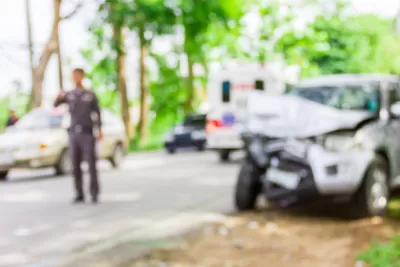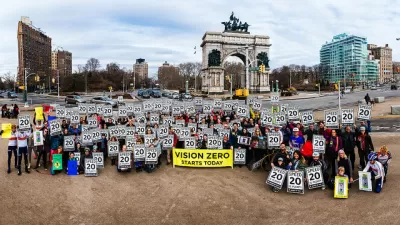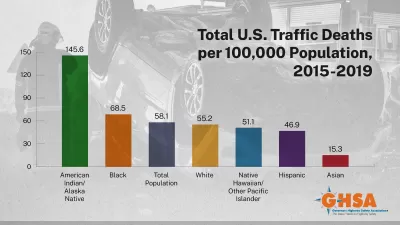The reckless and dangerous driving that has been a hallmark of the Covid-19 pandemic could become a more common, permanent feature of life in the United States.

Emily Baumgaertner and Russ Mitchell write for the Los Angeles Times about new traffic safety data that solidifies a dangerous trend that began during the pandemic.
"The latest evidence suggests that after decades of safety gains, the pandemic has made U.S. drivers more reckless — more likely to speed, drink or use drugs and leave their seatbelts unbuckled," according to the article.
The most recent data driving the conclusions expressed in the article were published in October by the National Highway Traffic Safety Administration. The report details traffic fatalities for the first half of 2021, when an estimated 20,160 people died in motor vehicle crashes—an 18 percent increase from 2020. (The carnage on U.S. roads during 2020 should not be underestimated based on this comparison, however.)
The article cites Ken Kolosh, a researcher at the nonprofit National Safety Council, to make the case that the trend of reckless, dangerous driving is likely to persist beyond the pandemic.
“I fear we’ve adopted some really unsafe driving habits, and they’re going to persist,” Kolosh said. “Our roads are less safe than they were pre-pandemic.”
According to the article, the reckless driving apparent in traffic safety statistics is mirrored in other reckless behavior during the pandemic: "Alcohol sales have soared, drug overdoses have set new records, and homicides have seen their biggest increase on record."
Frank Farley, a professor of psychology at Temple University in Philadelphia, is also cited in the article saying the pandemic has ushered in a "sea change in psychology." In the world after Covid-19, according to Farley, reckless driving is an arousal of "arousal breakout"—or a rebellious reaction to the restrictions of pandemic life.
FULL STORY: Car crash deaths have surged during COVID-19 pandemic. Here’s why

Planetizen Federal Action Tracker
A weekly monitor of how Trump’s orders and actions are impacting planners and planning in America.

Maui's Vacation Rental Debate Turns Ugly
Verbal attacks, misinformation campaigns and fistfights plague a high-stakes debate to convert thousands of vacation rentals into long-term housing.

San Francisco Suspends Traffic Calming Amidst Record Deaths
Citing “a challenging fiscal landscape,” the city will cease the program on the heels of 42 traffic deaths, including 24 pedestrians.

Amtrak Rolls Out New Orleans to Alabama “Mardi Gras” Train
The new service will operate morning and evening departures between Mobile and New Orleans.

The Subversive Car-Free Guide to Trump's Great American Road Trip
Car-free ways to access Chicagoland’s best tourist attractions.

San Antonio and Austin are Fusing Into one Massive Megaregion
The region spanning the two central Texas cities is growing fast, posing challenges for local infrastructure and water supplies.
Urban Design for Planners 1: Software Tools
This six-course series explores essential urban design concepts using open source software and equips planners with the tools they need to participate fully in the urban design process.
Planning for Universal Design
Learn the tools for implementing Universal Design in planning regulations.
Heyer Gruel & Associates PA
JM Goldson LLC
Custer County Colorado
City of Camden Redevelopment Agency
City of Astoria
Transportation Research & Education Center (TREC) at Portland State University
Jefferson Parish Government
Camden Redevelopment Agency
City of Claremont





























